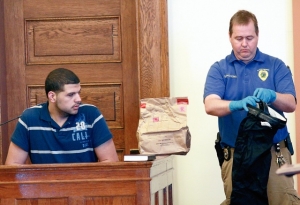Victim's son testifies in robbery murder trial
By Kenneth Fine
Published in News on April 26, 2012 1:46 PM

News-Argus/BOBBY WILLIAMS
Steven Powers, a member of the Goldsboro Police Department Crime Scene Unit, shows a pair of pants to Mahmud Kandeel, the son of shooting victim Ribhi Mohammed Kandeel, Wednesday morning.
Mahmud Kandeel kept his poise when Assistant District Attorney Mike Ricks asked a Goldsboro police officer to show the young man the bloody shirt his father, Ribhi, was wearing the night he was shot.
He remained stoic as he identified a photo of his father taken during the autopsy conducted after he died -- as he talked about the quality of Ribhi's life after a bullet left him paralyzed.
"It was a dramatic scene," Mahmud said. "The man suffered."
His expression never changed -- not when he was asked to identify two of the men accused of murdering the man who took a turn for the worse nearly two years after the shooting; not when family members sobbed and wailed.
But the scene that unfolded during his testimony was not the most dramatic moment that transpired Wednesday in Courtroom No. 1.
Ricks made sure of that.
Moments after members of the jury were excused for the day, the DA told Special Superior Court Judge Jack Jenkins that a key witness for the state, an eyewitness, was reluctant to testify -- that people had shown up at her apartment and threatened to kill her if she took the stand.
"We're trying," Ricks said.
The following is a recap of the second day of testimony:
Prosecution, Witness No. 3 -- Mahmud Kandeel: Kandeel, the son of the victim, told the jury about the way his father conducted business at the Brookside Convenient Mart. He talked about the gun kept in the store and his father's typical routine as he closed for the day. He identified several articles of clothing, including a bloody shirt that his father was wearing the night of the shooting. And he also talked about how he responded to the phone call that alerted him to the fact that Ribhi had been shot. "The first thing I did was get in that car," he said. Mahmud answered questions about two of the defendants, Rashard Oliver and Quentin Kenon, and testified that they were regulars at the store. And, outside of the presence of the jury, he told the court that his father wanted retribution for his pain. "He said, 'I want them to suffer the same way I did,'" Mahmud said. "He was going to kill them."
Prosecution, Witness No. 4 -- Brenda McCall: McCall, a former employee at the Brookside Convenient Mart, said she saw one of the defendants in the days after the shooting -- that Rashard Oliver was carrying around more money than she would "expect him to have." And she alleged that when she asked him if "the streets were talking," he said he knew what happened but didn't want to say out of fear that something might happen to him. She testified that when she approached him, "he look shook" -- that "when he saw me, his whole demeanor changed." And she told the court that she informed the police that Oliver was acting suspicious. During cross-examination, defense attorneys pointed out that Ms. McCall had called the police several times about the incident at Brookside -- that she had identified several "suspicious" people. Attorney Mary Darrow even suggested that the woman engaged in a "gung-ho" investigation of her own.
Prosecution, Witness No. 5 -- John Reinier: Reinier, a former Goldsboro police officer, testified that he had an encounter with one of the defendants outside the Brookside Convenient Mart several months before the shooting. Rashard Oliver, he told the court, was wearing blue jeans and a red bandanna when Reinier stopped to interview him one day in what he characterized as a "high crime area." But when Darrow asked him how Oliver responded to the encounter, the former officer testified that "he gave me no hassle."
Prosecution, Witness No. 6 -- Dr. Kristan Roman: Roman, a forensic pathologist, performed the autopsy on Kandeel in New York. After being deemed an "expert" by the court, she testified that being shot was the cause of Kandeel's death. She said that the paralysis caused by the bullet lead to bed sores -- that those sores later caused an infection that spread throughout the man's body. And even though Darrow and other defense counsel implied that improper medical care might have led to the sores, the doctor maintained that Kandeel would likely still be alive had he not been shot -- that the infection that killed him was "a direct consequence" of the spinal cord injury he suffered in the shooting.
Prosecution, Witness No. 7 -- Dr. Steve Moye: Moye, an emergency physician, treated Kandeel at Wayne Memorial Hospital shortly after the shooting. After being deemed an "expert" by the court, he testified that Kandeel arrived at the hospital via rescue and "had a gunshot wound in his right shoulder." He added that X-rays showed what appeared to be a bullet in the left side of his body -- that the man had a "total loss of sensation" from just below the nipple down. During cross-examination, defense attorney Randall Hughes asked Moye if Kandeel was "stable" when he was airlifted to Pitt Memorial Hospital. Moye said he was.
